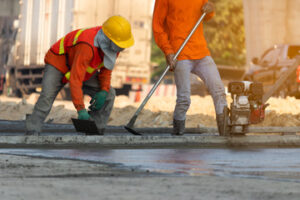Before pouring concrete into your driveway, you should prepare it properly. Depending on your needs, you can prepare the surface with wire mesh or steel bars. When preparing the surface, avoid overworking or cracking the concrete surface. If your driveway is poured over gravel, dampen it before pouring concrete. Spread the concrete by using a shovel from one corner of the form.
 Installing a concrete driveway is a challenging job. Even though concrete is easy to work with on a small scale, installing a concrete driveway is a big task and requires careful planning and preparation. It is best to hire a professional concrete contractor for the job. In the case of large driveways, it is better to divide the installation into smaller sections. This will make it easier to work with. This way, you can avoid the risks of cracks or shattered concrete.
Installing a concrete driveway is a challenging job. Even though concrete is easy to work with on a small scale, installing a concrete driveway is a big task and requires careful planning and preparation. It is best to hire a professional concrete contractor for the job. In the case of large driveways, it is better to divide the installation into smaller sections. This will make it easier to work with. This way, you can avoid the risks of cracks or shattered concrete.
Concrete is one of the most durable driveway materials available. It can last up to 50-60% longer than lesser-quality materials. In addition, it is resistant to water, UV radiation, and oxidation. It also adds a significant visual upgrade to your driveway. Unlike asphalt and pavers, a concrete driveway looks great with landscaping.
A concrete driveway should be a minimum of three inches thick. A thicker slab is ideal for heavier vehicles. A driveway should slope at least one inch per foot. For added strength, consider using rebar. The addition of rebar improves the concrete’s tensile, flexural, and compressive strength. Using #4 rebar will increase compressive strength to 6,600 psi, while adding a fifth-inch piece will give your driveway an impressive 11,780 psi.
When installing a concrete driveway, it is important to allow it to cure for at least seven days. This will help the concrete reach its full strength before you begin loading your vehicle. In addition to waiting for the concrete to cure, you should regularly spritz the surface with water. This will help prevent the concrete from drying out too quickly.
Before pouring concrete on your driveway, you should prepare the area by placing wood stakes at regular intervals. You can also add rebar to strengthen the concrete and help prevent cracking. Then, use a rammer to compact the gravel and soil. Once the form is prepared, you can begin pouring the concrete. Make sure to check your form every three feet for a smooth and flat surface.
A concrete driveway can be reinforced with 1/2-inch steel rebar or wire mesh. These two materials work best on a four to five inches thick driveway. But rebar isn’t necessary for driveways less than five inches thick. To add more support, you may consider adding blocks underneath the reinforcement. The spacing between bars should be at least 12 inches apart.
When installing a concrete driveway, you should also consider the thickness of the surface and the jointing. An uneven surface will cause cracks. You should also ensure that the joints are at least 1/4 inch thick. Aside from ensuring the stability of your driveway, it would be best if you also considered the driveway’s aesthetics. Choosing the right color can give you an attractive and unique look.
Before you choose the concrete driveway for your home, it is best to hire a professional. This will save you money. The price of a concrete driveway depends on the size of the driveway. Concrete driveways are generally cheaper than other types of driveway. But you need to be prepared to pay more money if you want to get a personalized driveway.
The size and shape of your driveway determines the order in which concrete will be laid. If you want to change the dimensions, you will compromise the driveway’s functionalities and strength. Moreover, concrete driveways need a solid sub-base. A well-compacted hardcore at least 100 mm deep is recommended.
When planning a driveway, it is important to know your local code requirements. These codes vary from jurisdiction to jurisdiction. Most ordinances address the width and depth of the driveway. Other requirements are set by different home associations. In the International Residential Building Code, Section 5 details the required site preparation, fill, and concrete thickness. In addition, you should note that different areas have different standards. The International Residential Building Code also states the minimum compressive strength of concrete slabs.
Another way to improve the durability of your concrete driveway is to seal it with a special concrete sealer. This type of sealer is applied with a roller or brush and can last for many years. The type of sealer you choose will determine the quality of the concrete driveway.